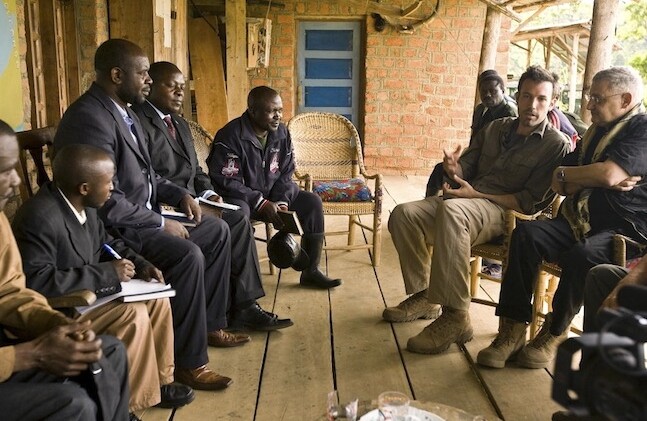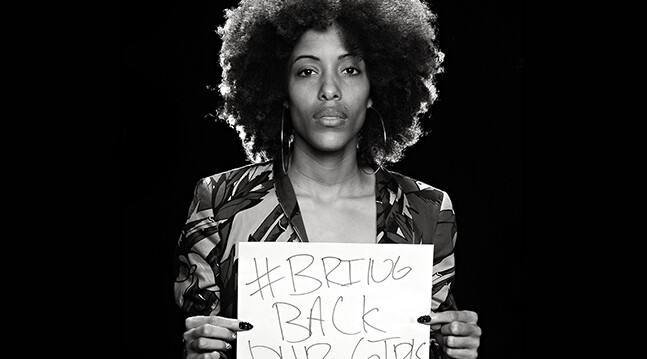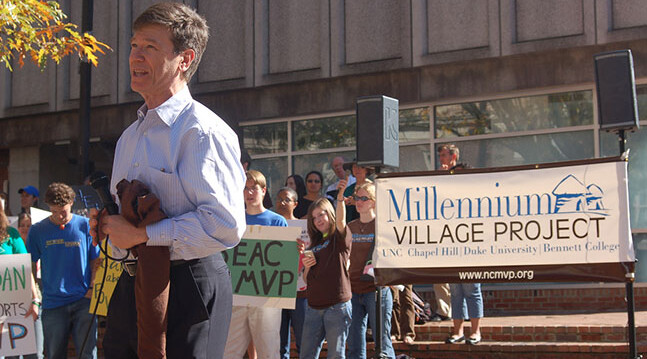Followers of global affairs can't have missed the recent headlines touting Hollywood actor/director Ben Affleck's activism on behalf of the Democratic Republic of the Congo (DRC).1 Since co-founding his organization Eastern Congo Initiative (ECI) in 2010, Affleck has been circulating among media outlets and meeting with U.S. policymakers to speak about social and economic development in the DRC. Rather quickly, Affleck's work and ECI have received plaudits from Save the Children, Facebook, and the U.S. Department of State.2 He has been invited three times to testify before Congressional committees about his work in the DRC. Comparing Affleck to other celebrity humanitarians, GlobalPost gives him five stars for his "Quiet commitment, strong focus."3 But Affleck's work also has been met by skepticism and playful derision, prompting headlines such as "What makes Batman a policy expert on the Congo?"4 As an A-list celebrity with a deep commitment to a humanitarian cause, Affleck provides an ideal case study of the potential pitfalls of celebrity involvement in global affairs.
Recent years have seen a growth industry for celebrities engaged in humanitarian activities. The website Look to the Stars has calculated that over 2,000 charities have some form of celebrity support.5 UNICEF has dozens of "Goodwill Ambassadors" and "Advocates" such as Angelina Jolie and Mia Farrow. Celebrities have entered forums for global governance to pressure political leaders: George Clooney has spoken before the United Nations while Bob Geldof, Bono, and Sharon Stone have attended summits like DAVOS and the G8 to discuss third world debt, poverty, and refugees. In the U.S. policy arena, Affleck joins Nicole Kidman, Angelina Jolie, and other celebrities who have addressed the U.S. Congress on international issues.6 The increase in celebrity involvement has spurred debate in academic circles and mainstream media. Celebrity humanitarianism is alternately lauded for drawing media attention and fostering popular engagement and criticized on a number of ethical grounds. According to Mother Jones, Africa is experiencing a "recolonization" as celebrities from the U.S. and UK lay claim to particular countries as recipients of their star power: South Africa (Oprah), Sudan (Mia Farrow), and Botswana (Russell Simmons).7 As the involvement of American celebrities in humanitarian causes grows, let us consider the activities of Affleck and his Eastern Congo Initiative.
Celebrity Humanitarians
Affleck can be considered a "celebrity humanitarian," a celebrity figure who has moved beyond his/her day job as an entertainer to delve into the areas of foreign aid, charity, and development. These activities can involve fundraising, hosting concerts and events, media appearances, and engaging in advocacy. Celebrities are distinguished by their unique ability to attract and engage diverse audiences ranging from their fan base and the media to political elites and philanthropists. Celebrity humanitarians often play an important bridging role, introducing Northern publics to issues in the developing world. They also use their star power to gain access to policy-making circles to effect social and political change. Since 1980, the U.S. Congress has seen the frequency of celebrity witnesses double to around 20 a year with most celebrity appearances taking place before committees addressing domestic issues. Interestingly, fewer than 5 percent of celebrity witnesses testify before committees dealing with foreign relations, where celebrity humanitarians push the United States to address global concerns.8
The rise and influence of celebrity humanitarians activate debates on the consequences of their involvement. For some academics and practitioners, celebrities are welcome figures in humanitarianism: educating the public on global issues, raising funds, and using their populist appeal to draw attention to policy-making arenas. For others, celebrity humanitarians are highly problematic figures who dilute debates, offer misguided policy proposals, and lack credibility and accountability. Celebrity humanitarianism privileges and invests the celebrity figure with the responsibility of speaking on behalf of a "distant other" who is unable to give input or consent for their representation. Stakeholders in the developing world unwittingly rely on the celebrity humanitarian as their communicator, advocate, and fundraiser. Finally, celebrities are held to be self-serving, engaging in humanitarian causes to burnish their careers.
Ben Affleck
A screenwriter, actor, and director, Affleck came to fame in the mid-1990s and steadily rose within the ranks of Hollywood. Two years ago, he directed, co-produced, and acted in the film Argo, earning a Golden Globe for best director and the 2013 Oscar for best picture. By 2006, Affleck had become linked to over a dozen domestic and international charities and NGOs.9 But, in 2008, Affleck began suggesting that fundraising alone, in particular around Africa, was insufficient and potentially counterproductive. While attending a charity event, Affleck remarked that fundraising in the West discounted the efforts of would-be recipients in Africa to formulate their own solutions: "I think sometimes that gets out the message disproportionately that this is a place just full of misery and awfulness and suffering and it does a disservice in a way to 800 million people on a continent."10 Around the same time, Affleck chose to focus his humanitarian activities on the DRC, which was motivated, in part, by the excess attention given to Darfur; he reasoned, "I thought a lot of people are advocating on Darfur. I'd just be a very small log on a big fire. I started getting interested in Congo and I thought, this is a place where I can have a really big impact."11
Around the same time, Affleck embarked on a series of steps to educate himself, reading widely and speaking with experts. During nine trips to eastern Congo, he visited refugee and camps for internally displaced persons, hospitals, and gold mines where he met with "warlords and peacemakers, survivors and aid workers."12 Affleck's self-education took place in the public eye; ABC News accompanied Affleck on his third fact-finding mission, and he penned an essay for the network's website with reflections on the constraints and possibilities of his engagement. Anticipating questions about his commitment, Affleck wrote:
"It makes sense to be skeptical about celebrity activism. There is always the suspicion that involvement with a cause may be doing more good for the spokesman than he or she is doing for the cause. I welcome any questions about me and my involvement, but I hope you can separate whatever reservations you may have from what is unimpeachably important about this segment: the plight of eastern Congo."13
Affleck displays recognition of the charges levied against celebrity humanitarianism. In his writings and speeches, Affleck regularly cites local knowledge and connections, names partners and international organizations that operate in the region, and refers to statistical data from the UN and the International Rescue Committee.Eastern Congo Initiative
In the past decade, a handful of celebrity humanitarians have chosen to create organizations to highlight what they see as neglected areas and causes. This group includes singer and entertainer Madonna, who established Raising Malawi in 2006 to build schools. In 2010, following the earthquake in Haiti, the actor Sean Penn founded the J/P Haitian Relief Organization, which is focused on local relief efforts and sustainable development. The decision to start an organization offers a celebrity humanitarian the possibility to set a firm foundation for activism and leadership, signaling a long-term commitment to an issue. This move also raises the credibility of the celebrity figure, who gains firsthand experience in humanitarian work and fashions his or her own vision for achieving progress.
To create his organization, Affleck turned to a strategic advisory firm based in Seattle, Washington, called Williamsworks.14 The firm works for foundations, non-profit organizations, and corporations; it boasts impressive political connections and financial ties. Williamsworks also consults for other celebrity-led organizations like ONE, led by the musician Bono, and Water.org, co-founded by Affleck's childhood friend and actor Matt Damon.15 The founder and CEO of Williamsworks Whitney Williams serves as co-founder of ECI alongside Affleck.
In March 2010, the Eastern Congo Initiative (ECI) was launched as "the first U.S. based advocacy and grant-making initiative wholly focused on working with and for the people of eastern Congo."16 The two-prong approach of ECI straddles political and humanitarian objectives across two sites of activity: the United States and Eastern Congo. Advocacy in the United States includes lobbying, commissioning White Papers, forging partnerships with government agencies, and sending representatives to testify on Capitol Hill. In the DRC, ECI has given grants to 23 community-based organizations.1 17 With the support of USAID, ECI has also created a database to connect funders to Congolese organizations.
Some features distinguish ECI as a celebrity-led organization. It began with a multi-million dollar fund collected before commencing operations, evaluating its programs, and demonstrating effectiveness in the field. High profile funders include Google and the Howard G. Buffett Foundation. In comparison, consider that the DC-based Congo organizations Friends of the Congo and Congo Global Action, Inc. had $66,000 and $50,000 in contributions for 2010, respectively.18 Affleck and ECI have also been given extensive and early attention: within a year of its founding, ECI was highlighted by the Chronicle of Philanthropy as "an example of a smart approach."19 In addition to glowing compliments bestowed by former Secretary of State Hillary Clinton, Affleck was recently awarded the Global Child Advocate Award from the humanitarian agency Save the Children.20 Though Affleck is ECI's most public figure, he is absent from most of the website. But a quick visit to the "ECI Press" will find Affleck's presence dominating media coverage of ECI's work. A headline from 2012 insinuates that ECI's co-founder has other ambitions in addition to his humanitarian work: "Affleck Doesn't Close Door on Senate Run."21
Affleck and ECI gained traction quickly in the political world of Washington, D.C., with an advocacy agenda focused on shaping U.S. foreign policy towards the DRC. Paid lobbyists visit government offices and policymakers on ECI's behalf. The most visible outcome of this lobbying and ECI's status as a celebrity-led organization have been the three invitations Affleck has received to testify before Congress as an expert witness. These invitations came from the House Subcommittee on Africa, Global Health and Human Rights, the House Armed Services Committee, and the Senate's Foreign Relations Committee. In his appearances, Affleck discusses U.S. foreign policy, reviews the challenges facing the DRC, reports on the work of ECI in supporting community-based organizations, gives his thoughts about security, and pushes for U.S. leadership in the region. Other speakers sitting beside Affleck have included the U.S. Special Envoy, diplomats, academic, development experts, and other DRC advocates. Members of Congress shower Affleck with praise and compliment his expertise while media outlets fill the hearing rooms.
Concluding Observations
Let me briefly assess Affleck's efforts and the work of ECI against some of the prevailing concerns around celebrity humanitarianism and offer a few prescriptions.
Celebrity humanitarians should do their homework to earn credibility while also respecting their bounded roles as celebrity figures. As a celebrity humanitarian, Affleck's proposals are based on serious preparation: spending years to gain an in-depth understanding, consulting with professionals, narrowing his advocacy efforts to a single region, and enduring the scrutiny of the cameras and the blogosphere. Besides this self-education, his credibility is based on ECI's dual mission of re-granting and policymaking. Since ECI has operations and partnerships in the DRC, the content of Affleck's writings and Congressional testimonies are grounded in the realities of the DRC, peppered with first-hand accounts, and supported by statistics and other research. However, there are limits to his knowledge—Affleck is not a development expert or on-the-ground professional; his day job and main career lie elsewhere. And while the decision to found an organization suggests that Affleck's commitment to the DRC will extend beyond his nascent efforts, rumors that he may seek political office distort this image.
Celebrity humanitarians must find a way to avoid diverting resources and attention. Rather than bring his star power and ample financial support to existing Congolese organizations, ECI furnished a platform for Affleck's advocacy and leadership that amplifies his voice over those of the Congolese. Nor was ECI crafted inside eastern Congo but in the offices of a strategic advisory firm based in Seattle. ECI is privately funded by a network of financial elites and does not rely on means-tested grant cycles or public support. While Affleck has received multiple awards in the short period he has been a celebrity humanitarian, his star power also distracts us from the people who work in the field of humanitarianism on a daily basis and rarely receive such recognition.22 And by concentrating attention and money for Affleck's issue of Eastern Congo, other causes and countries may go unnoticed.
Finally, celebrity humanitarians should take seriously the responsibility of speaking for others and accept that there may be negative consequences for their work. Affleck's prominence as an advocate for DRC gives his proposals greater significance but also greater risks. With his enviable access, Affleck is able to speak directly to U.S. lawmakers and his testimony has the opportunity to shape U.S. foreign policy toward the DRC. But, as an American presuming to speak on behalf of the Congolese people, Affleck runs the risk of misrepresenting their interests. Should Affleck's policy proposals ultimately prove ineffective or have negative consequences, ECI's existence would not be threatened since ECI's funders and supporters are in the United States. Nor will Affleck's status as a celebrity humanitarian likely be affected.
As a celebrity humanitarian, Affleck has earned both praise and cynicism for his decision to "lend his star power to Congo." His work draws attention to the DRC, raises money, and highlights the work of Congolese community-based organizations. The magnetic pull of his celebrity is undeniable: as an Oxfam representative pointed out, Affleck's recent testimony before Congress in 2014 received three times the coverage of other hearings about Africa.23 And fundraising for ECI continues to be robust; in 2012, the organization reported contributions and grants amounting to over $1.8 million.24 But, we would do well to remember that celebrity humanitarians are privileged figures. The people of eastern Congo did not choose Affleck to be their acting representative in Washington, D.C., nor can they vote him out of his position. As celebrity humanitarians grow in number and build influence, we must consider the potential implications, good and bad, that they may have on the lives of people around the world.
This piece is drawn from a chapter on Ben Affleck, which will be included in the forthcoming volume edited by Lisa Ann Richey, Celebrity Humanitarianism and North-South Relations: Politics, Place and Power (London and New York: Routledge). See website for more details: http://tandf.net/books/details/9781138854284/.
Further reading:
Brockington, D. 2014. Celebrity Advocacy and International Development. London and New York: Routledge.
Cooper, A.F. 2008. Celebrity Diplomacy. Boulder: Paradigm Publishers.
Kapoor, I. 2013. Celebrity Humanitarianism: Ideology of Global Charity. New York: Routledge.
Tsaliki, L., C.A. Frangonikolopoulos, and A. Huliaras, eds. 2011. Transnational Celebrity Activism in Global Politics: Changing the World? Bristol: Intellect.
Wheeler, M. 2013. Celebrity Politics. Cambridge: Polity.
NOTES
1 George Stephanopoulos, "Ben Affleck Aims to Give Back with Work in the Congo," ABC News, 2 March 2014, http://abcnews.go.com/blogs/politics/2014/03/ben-affleck-aims-to-give-back-with-work-in-congo/
Meleika Gardner, "Ben Affleck Fighting to Save Lives in the Congo," Guardian Liberty Voice, 4 March 2014, http://guardianlv.com/2014/03/ben-affleck-fighting-to-save-lives-in-the-congo/
John Hudson, "Exclusive: Ben Affleck to Tesifty Before Congress as an Africa Expert," Foreign Policy, 20 February 2014, http://thecable.foreignpolicy.com/posts/2014/02/19/ben_affleck_to_testify_before_congress_as_an_africa_expert
2 BK Ryer, "Ben Affleck Praised by US State Department on Facebook," Guardian Liberty Voice, 28 February 2014, http://guardianlv.com/2014/02/ben-affleck-praised-by-us-state-department-on-facebook/;
VH1, "Ben Affleck Wins Do Something Facebook," 21 August 2012, http://www.vh1.com/video/misc/827816/ben-affleck-wins-do-something-facebook.jhtml
3 Tristan McConnell, From Ben Affleck and George Clooney to Madonna and Bono: A scorecard for celebrities in Africa," Globalpost, 27 February 2014, http://www.globalpost.com/dispatch/news/regions/africa/140227/ben-affleck-and-george-clooney-madonna-and-bono-scorecard-celebr
4 Annick Febrey, "What makes Batman a policy expert on the Congo?" Oxfam America The Politics of Poverty, 3 March 2014, http://politicsofpoverty.oxfamamerica.org/2014/03/makes-batman-policy-expert-congo/
5 Look to the Stars, n.d. "Charities with Celebrity Supporters." Available at http://www.looktothestars.org/charity [20 November 2014]
6 ProQuest, "Quick Start: Congressional Hearings Digital Collection: Famous (Celebrity) Witnesses,"
http://proquest.libguides.com/quick_start_hearings/famouscelebs7 Dave Gilson, "Dr. Clonney, I Presume?" Mother Jones, March/April 2010 Issue, http://www.motherjones.com/politics/2010/03/africa-celebrities-madonna-oprah-brangelina-george-clooney
8 See Demaine, L.J., n.d. Navigating Policy by the Stars: The Influence of Celebrity Entertainers on Federal Lawmaking. Journal of Law & Politics, 25 (2), 83–143;
Thrall, A. T., Lollio-Fakhreddine, J., Berent, J., Donnelly, L., Herrin, W., Paquette, Z., ... & Wyatt, A. (2008). Star power: Celebrity advocacy and the evolution of the public sphere. The International Journal of Press/Politics, 13 (4) (October), 362-385.
9 Look to the Stars, n.d. Ben AffleckCharity Work, Events and Causes. Available from http://www.looktothestars.org/celebrity/ben-affleck [26 November 2012]
10 Dawn Walton, "Affleck's Star Lights Up Calgary Event," Globe and Mail, 16 June 2008, http://www.langfieldentertainment.com/19-06-08-ONEXONE.htm
11 Associated Press, 2008. ‘Ben Affleck visits refugee camps in Congo.' The New Zealand Herald. November 21.
12 Ben Affleck, "Turning World's Eyes and Ears to Congo," ACB News, 26 November 2008. Available from http://abcnews.go.com/Nightline/story?id=5234555&page=1 [21 January 2013].
13 Ben Affleck, "Turning World's Eyes and Ears to Congo," ACB News, 26 November 2008.
14 Williamsworks, "Eastern Congo Initiative," http://williamsworks.com/our-clients/eastern-congo-initiative/
15 Mickey Rapkin, "When Ben Affleck Wants to Change the World, He Calls This Woman," Elle, 11 November 2013, http://www.elle.com/life-love/society-career/whitney-williams-profile
16 Eastern Congo Initiative, http://www.easterncongo.org
17 Eastern Congo Initiative, "Grantmaking", http://www.easterncongo.org/about/grantmaking
18 See GuideStar for IRS Form 990s, Available at http://www.guidestar.org/ [29 October 2014]
19 C. Preston. ‘Behind a Celebrity's Bid to Help Eastern Congo.' The Chronicle of Philanthropy, 20 April 2011, Available at http://philanthropy.com/blogs/conference/behind-a-celebritys-bid-to-help-eastern-congo/27994 [26 November 2012].
20 TV News Desk, "Jennifer Garner, Ben Affleck & More Set for 2nd Annual Save the Children Gala," tvworld.com 15 October 2014. Available at http://www.broadwayworld.com/bwwtv/article/Jennifer-Garner-Ben-Affleck-More-Set-for-2nd-Annual-Save-the-Children-Gala-20141015# [10 November 2014]
21 Eastern Congo Initiative, "ECI Press," http://www.easterncongo.org/gallery/eci-press
22 Marina Hyde, "Angelina Jolie, Paris Hilton, Lassie and Tony Blair: here to save the world," The Guardian, 27 November 2014,
http://www.theguardian.com/lifeandstyle/lostinshowbiz/2014/nov/27/angelina-jolie-paris-hilton-tony-blair-lassie-save-the-children-award?CMP=share_btn_fb23 Annick Febrey, "What makes Batman a policy expert on the Congo?" Oxfam America The Politics of Poverty, 3 March 2014, http://politicsofpoverty.oxfamamerica.org/2014/03/makes-batman-policy-expert-congo/
24 See Eastern Congo Initiative, 2012. ‘Eastern Congo Initiative Forms 990 and Docs.' Available from GuideStar at http://www.guidestar.org/organizations/45-4103655/eastern-congo-initiative.aspx [10 November 2014]



